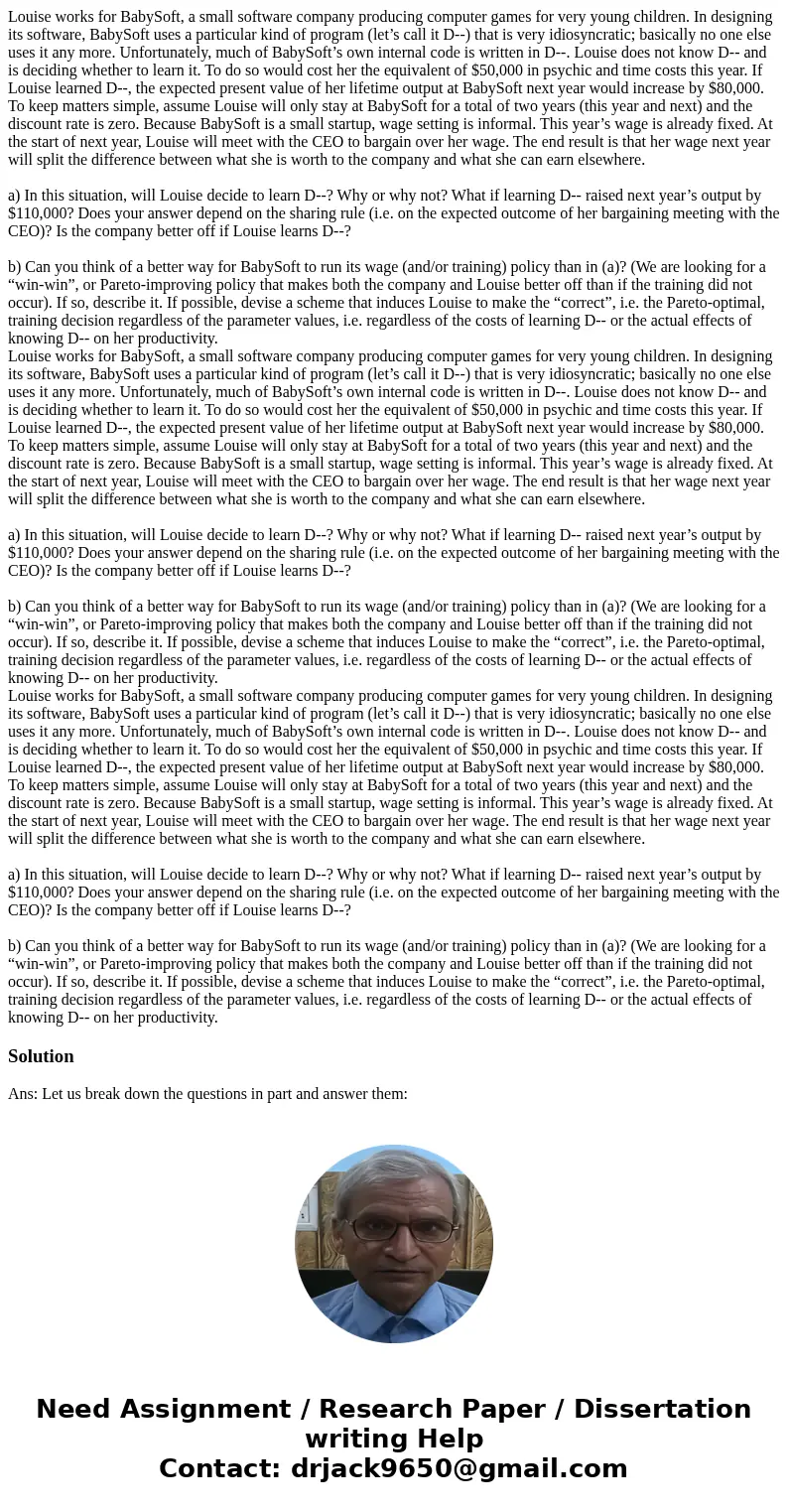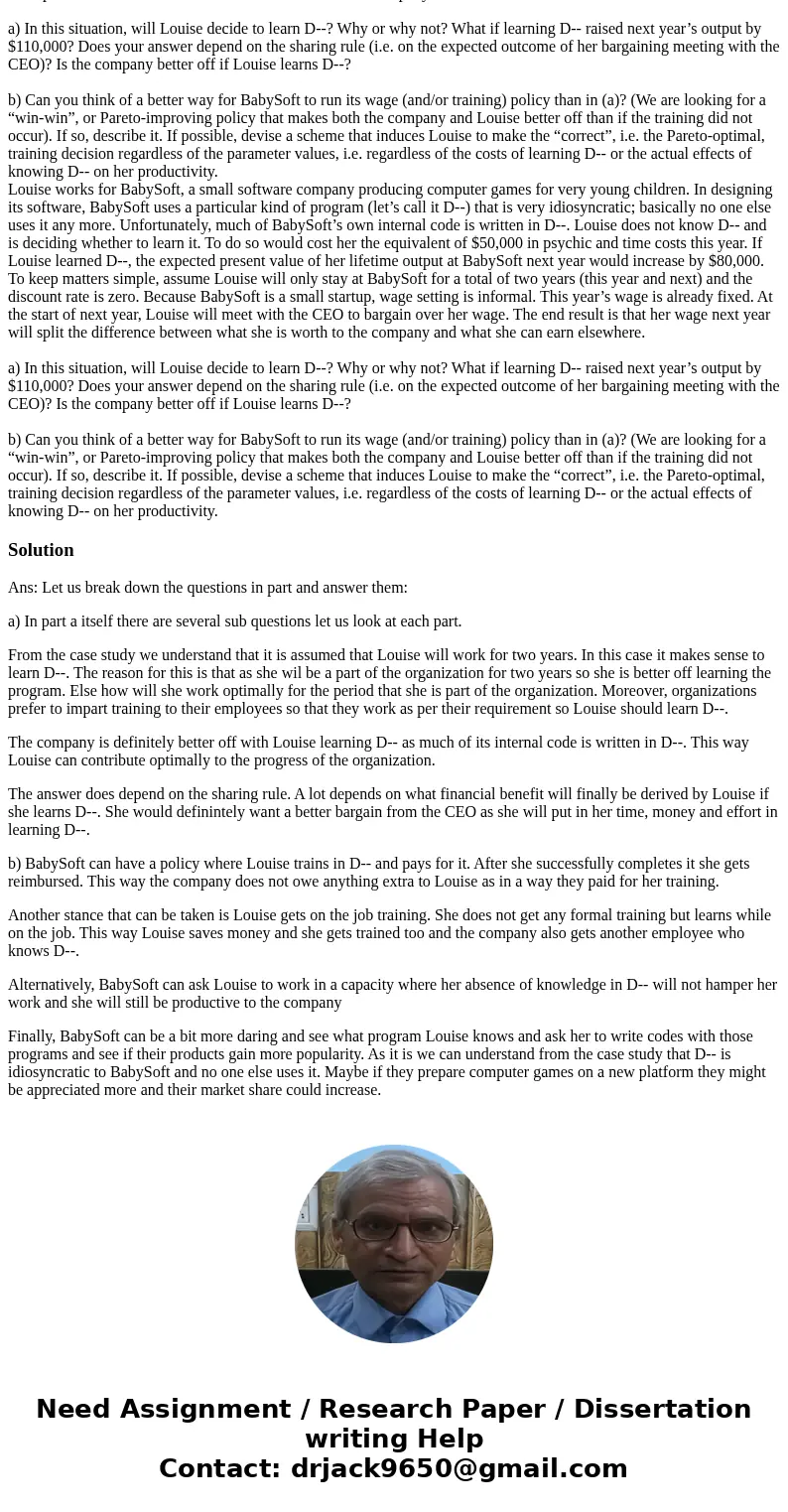Louise works for BabySoft, a small software company producing computer games for very young children. In designing its software, BabySoft uses a particular kind of program (let’s call it D--) that is very idiosyncratic; basically no one else uses it any more. Unfortunately, much of BabySoft’s own internal code is written in D--. Louise does not know D-- and is deciding whether to learn it. To do so would cost her the equivalent of $50,000 in psychic and time costs this year. If Louise learned D--, the expected present value of her lifetime output at BabySoft next year would increase by $80,000. To keep matters simple, assume Louise will only stay at BabySoft for a total of two years (this year and next) and the discount rate is zero. Because BabySoft is a small startup, wage setting is informal. This year’s wage is already fixed. At the start of next year, Louise will meet with the CEO to bargain over her wage. The end result is that her wage next year will split the difference between what she is worth to the company and what she can earn elsewhere.
a) In this situation, will Louise decide to learn D--? Why or why not? What if learning D-- raised next year’s output by $110,000? Does your answer depend on the sharing rule (i.e. on the expected outcome of her bargaining meeting with the CEO)? Is the company better off if Louise learns D--?
b) Can you think of a better way for BabySoft to run its wage (and/or training) policy than in (a)? (We are looking for a “win-win”, or Pareto-improving policy that makes both the company and Louise better off than if the training did not occur). If so, describe it. If possible, devise a scheme that induces Louise to make the “correct”, i.e. the Pareto-optimal, training decision regardless of the parameter values, i.e. regardless of the costs of learning D-- or the actual effects of knowing D-- on her productivity.
Louise works for BabySoft, a small software company producing computer games for very young children. In designing its software, BabySoft uses a particular kind of program (let’s call it D--) that is very idiosyncratic; basically no one else uses it any more. Unfortunately, much of BabySoft’s own internal code is written in D--. Louise does not know D-- and is deciding whether to learn it. To do so would cost her the equivalent of $50,000 in psychic and time costs this year. If Louise learned D--, the expected present value of her lifetime output at BabySoft next year would increase by $80,000. To keep matters simple, assume Louise will only stay at BabySoft for a total of two years (this year and next) and the discount rate is zero. Because BabySoft is a small startup, wage setting is informal. This year’s wage is already fixed. At the start of next year, Louise will meet with the CEO to bargain over her wage. The end result is that her wage next year will split the difference between what she is worth to the company and what she can earn elsewhere.
a) In this situation, will Louise decide to learn D--? Why or why not? What if learning D-- raised next year’s output by $110,000? Does your answer depend on the sharing rule (i.e. on the expected outcome of her bargaining meeting with the CEO)? Is the company better off if Louise learns D--?
b) Can you think of a better way for BabySoft to run its wage (and/or training) policy than in (a)? (We are looking for a “win-win”, or Pareto-improving policy that makes both the company and Louise better off than if the training did not occur). If so, describe it. If possible, devise a scheme that induces Louise to make the “correct”, i.e. the Pareto-optimal, training decision regardless of the parameter values, i.e. regardless of the costs of learning D-- or the actual effects of knowing D-- on her productivity.
Louise works for BabySoft, a small software company producing computer games for very young children. In designing its software, BabySoft uses a particular kind of program (let’s call it D--) that is very idiosyncratic; basically no one else uses it any more. Unfortunately, much of BabySoft’s own internal code is written in D--. Louise does not know D-- and is deciding whether to learn it. To do so would cost her the equivalent of $50,000 in psychic and time costs this year. If Louise learned D--, the expected present value of her lifetime output at BabySoft next year would increase by $80,000. To keep matters simple, assume Louise will only stay at BabySoft for a total of two years (this year and next) and the discount rate is zero. Because BabySoft is a small startup, wage setting is informal. This year’s wage is already fixed. At the start of next year, Louise will meet with the CEO to bargain over her wage. The end result is that her wage next year will split the difference between what she is worth to the company and what she can earn elsewhere.
a) In this situation, will Louise decide to learn D--? Why or why not? What if learning D-- raised next year’s output by $110,000? Does your answer depend on the sharing rule (i.e. on the expected outcome of her bargaining meeting with the CEO)? Is the company better off if Louise learns D--?
b) Can you think of a better way for BabySoft to run its wage (and/or training) policy than in (a)? (We are looking for a “win-win”, or Pareto-improving policy that makes both the company and Louise better off than if the training did not occur). If so, describe it. If possible, devise a scheme that induces Louise to make the “correct”, i.e. the Pareto-optimal, training decision regardless of the parameter values, i.e. regardless of the costs of learning D-- or the actual effects of knowing D-- on her productivity.
Ans: Let us break down the questions in part and answer them:
a) In part a itself there are several sub questions let us look at each part.
From the case study we understand that it is assumed that Louise will work for two years. In this case it makes sense to learn D--. The reason for this is that as she wil be a part of the organization for two years so she is better off learning the program. Else how will she work optimally for the period that she is part of the organization. Moreover, organizations prefer to impart training to their employees so that they work as per their requirement so Louise should learn D--.
The company is definitely better off with Louise learning D-- as much of its internal code is written in D--. This way Louise can contribute optimally to the progress of the organization.
The answer does depend on the sharing rule. A lot depends on what financial benefit will finally be derived by Louise if she learns D--. She would definintely want a better bargain from the CEO as she will put in her time, money and effort in learning D--.
b) BabySoft can have a policy where Louise trains in D-- and pays for it. After she successfully completes it she gets reimbursed. This way the company does not owe anything extra to Louise as in a way they paid for her training.
Another stance that can be taken is Louise gets on the job training. She does not get any formal training but learns while on the job. This way Louise saves money and she gets trained too and the company also gets another employee who knows D--.
Alternatively, BabySoft can ask Louise to work in a capacity where her absence of knowledge in D-- will not hamper her work and she will still be productive to the company
Finally, BabySoft can be a bit more daring and see what program Louise knows and ask her to write codes with those programs and see if their products gain more popularity. As it is we can understand from the case study that D-- is idiosyncratic to BabySoft and no one else uses it. Maybe if they prepare computer games on a new platform they might be appreciated more and their market share could increase.


 Homework Sourse
Homework Sourse